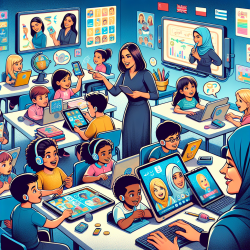Introduction
Intimate Partner Violence (IPV) is a pervasive issue that affects millions globally. A recent study titled "Intimate partner violence against women in Southern Punjab, Pakistan: A phenomenological study" sheds light on the socio-cultural dynamics of IPV in rural areas of South Punjab, Pakistan. This research provides valuable insights that can be leveraged to improve online therapy services for children, particularly those affected by IPV.
Understanding the Research
The study collected 46 in-depth interviews from married women who experienced IPV in rural South Punjab. Using a socio-ecological framework, the research identified multifaceted factors contributing to IPV, including individual, relationship, community, and societal levels. Key findings highlighted the roles of gender-based inequalities, cultural terminologies, and socio-economic factors in perpetuating IPV.
Implications for Online Therapy Services
As practitioners providing online therapy services to schools, it is crucial to understand the broader context of IPV and its impact on children. Here are some ways to implement the research outcomes to enhance therapy services:
1. Awareness and Sensitization
One of the study's conclusions emphasizes the need for awareness campaigns and gender sensitization drives. Practitioners can incorporate these elements into their therapy sessions by:
- Educating children about healthy relationships and respect.
- Providing resources and support for children who may be witnessing IPV at home.
- Collaborating with schools to create awareness programs for students and staff.
2. Addressing Trauma
Children exposed to IPV often experience trauma, which can affect their speech and language development. Practitioners can use trauma-informed approaches to address these issues:
- Implementing therapeutic techniques that focus on emotional regulation and resilience.
- Creating a safe and supportive online environment for children to express their feelings.
- Using data-driven assessments to tailor interventions to each child's needs.
3. Empowerment through Education
The study highlights the importance of education and employment in empowering women and challenging societal norms. This principle can be extended to children by:
- Encouraging educational attainment and providing resources for academic support.
- Incorporating life skills and self-advocacy training into therapy sessions.
- Promoting a growth mindset and resilience in children.
Encouraging Further Research
While the study provides valuable insights, there is a need for further research to explore the impact of IPV on children and effective interventions. Practitioners can contribute to this body of knowledge by:
- Conducting longitudinal studies to track the progress of children receiving therapy.
- Collaborating with researchers to develop evidence-based interventions.
- Sharing case studies and best practices within the professional community.
Conclusion
The research on IPV in Southern Punjab, Pakistan, offers critical insights that can be applied to improve online therapy services for children. By raising awareness, addressing trauma, and empowering children through education, practitioners can create positive outcomes for those affected by IPV. Continuous research and collaboration will further enhance our understanding and effectiveness in this vital area.
To read the original research paper, please follow this link: Intimate partner violence against women in Southern Punjab, Pakistan: A phenomenological study.










